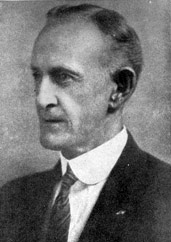Everglades Biographies
James Franklin Jaudon
James Franklin Jaudon was born in Waco, Texas on October 19, 1873.
Early in his youth, Jaudon moved with his parents to Orlando, Florida
where he attended public schools and studied with private tutors. At age
15 Jaudon started work as a clerk in the mercantile trade. He also joined
the army.
In 1895 Jaudon left Orlando with his brother Paul to establish a
mercantile business in Miami. He also helped organize Company L, Second
Battalion, Second Infantry, Miami, serving as sergeant, lieutenant and
eventually captain and post commander. Jaudon married Maude A. Coachman in
November 1911 and the couple settled on N.W. Fourth Avenue in Miami.
Captain Jaudon retired from military service in 1912.
In 1917 Jaudon established the Chevelier Corporation and served as its
President. The corporation purchased extensive land holdings in Monroe
County in southernmost Florida. Other business interests of Captain Jaudon
included the Tamiami Railway, the Royal Palm Sugar Cane and Planting
Company, the Tamiami Trail Committee, the Florida Rubber Company, the
Tamiami Trail Land Company, the Perrine Mercantile and Investment Company,
and the Heitman Estates/Bonita Springs development.
Jaudon was involved in most road construction projects in Miami in the
1910's and 1920's, promoting both the Ingraham Highway and Tamiami Trail
projects. He invested considerable funds of his own to extend the Tamiami
Trail eighteen miles from Miami west through Dade County. Indeed, it is
the Tamiami Trail for which Captain Jaudon may be best remembered. The
idea for building a highway to connect Florida's east and west coasts
originated with Jaudon while he was serving as Dade County's tax assessor
in 1915. As a landowner with interests in several townships south of the
proposed Tamiami Trail route, Jaudon had high expectations for development
and agriculture once the roadway was completed. His Chevelier Corporation
financed much of the road construction for the Trail in Dade and Lee
Counties. By 1918, Dade County had completed 43 miles westward from Miami.
On Florida's less populous west coast , road construction was
considerably slower. When the project faced delays due to lack of funding,
wealthy landowner Barron Collier offered to finance the operation under
one condition: the creation of a new county named for the real estate
magnate. Collier County was thus created out of the southern part of Lee
County. Jaudon and Collier battled over the Tamiami Trail's location in
southwest Florida: the dueling land developers pushed to locate the road
in their respective tracts. The state resolved the problem in favor of
Collier, thus creating the 'dog leg' in the middle section of the Tamiami
Trail. In April of 1928, thirteen years after its inception, the 283-mile
Tamiami Trail was completed. The peninsula's two tropical coasts were at
last connected, and life in south Florida was forever changed.
In the 1930, Captain.Jaudon moved west to Ochopee, Florida to pursue
his business endeavors -- a sugarcane plantation, rum distillery and
logging operation. He was the first postmaster of Ochopee. A few years
later, Jaudon prepared histories of Lee and Collier Counties for the
Federal Writer's Project. He was also involved, along with other
landowners in Dade and Monroe counties, in negotiating the boundaries of
the proposed Everglades National Park and establishing prices for land
sales.
James F. Jaudon -- Miami pioneer, entrepreneur, community leader and
"Father of the Tamiami Trail" --died in 1938.
Biography prepared by Gail Clement, Florida
International University

Photograph of Captain James F. Jaudon, 1926.
Image courtesy of History Miami (formerly Historical Museum of Southern
Florida



